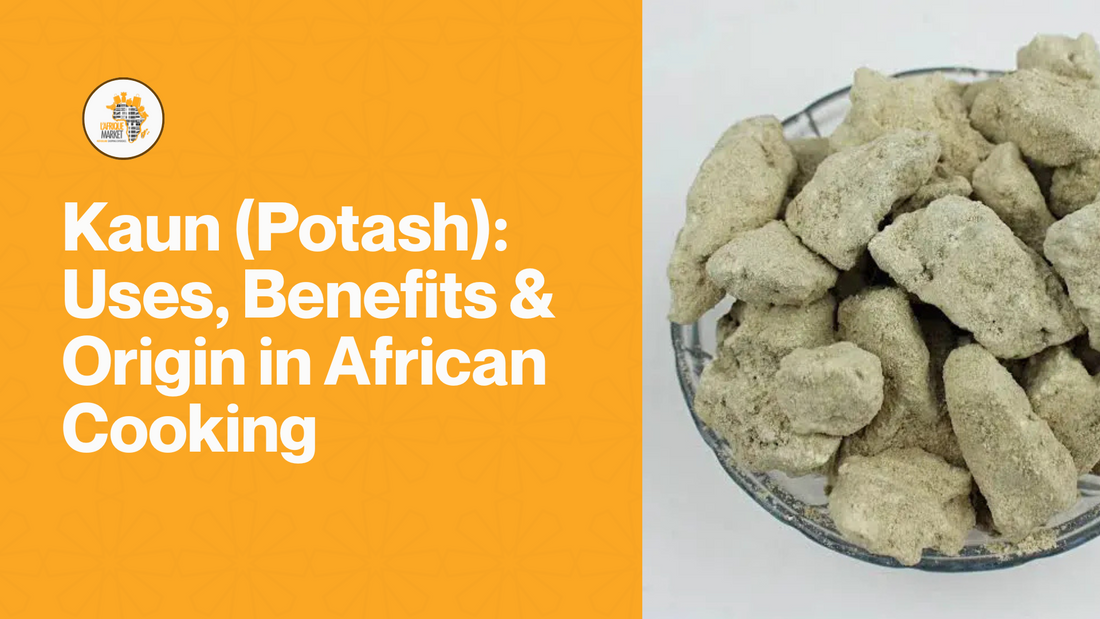
Kaun (Potash): Uses, Benefits & Origin in African Cooking
Share
If you grew up in a West African kitchen or ever watched your grandmother cook Ewedu, Okra, or Ogbono soup, chances are you’ve heard about Kaun, also known as potash. While it might look like an unusual ingredient to outsiders, it plays a powerful role in traditional African cuisine, both for its culinary magic and cultural legacy.
In this blog, we’ll explore what Kaun is, where it comes from, how it’s traditionally made, and the many ways it’s used in cooking. We’ll also cover important health considerations and tips for using it wisely.

Image from: Pharma News
What Is Kaun (Potash)?
Kaun, or potash, is a natural alkaline salt that’s widely used in West African cooking. Scientifically, potash refers to potassium carbonate, and it typically appears as white, chalky crystals or light brown rocks depending on its source.
Locally, it may go by various names:
- Kaun in Yoruba
- Akanwu in Igbo
- Potash in English-speaking parts of Africa
- Sometimes also called Kanwa in Hausa
It’s important to note that Kaun is not the same as the chemical potash (used in industrial agriculture). Traditional African potash is derived from natural or plant-based sources, making it more organic in its rawest form.
Also Read: How to Cook Ewedu and It’s Nutritional Value
Where Does Kaun Come From?
Traditionally, Kaun is made by burning wood, plantain peels, or palm fronds, then collecting the ashes. These ashes are then mixed with water and filtered. The filtered liquid is either:
- Boiled down to extract potash crystals, or
- Left to evaporate naturally, leaving behind the salt.
In parts of Northern Nigeria and Ghana, potash is also mined in small quantities from naturally occurring salt lakes and dry lakebeds, especially in arid or semi-arid regions. These natural potash deposits have been used for centuries in food and medicine.
How Is Kaun Used in African Cooking?
Kaun plays a unique role in West African kitchens—its main function is to soften tough vegetables or meats and increase the viscosity (sliminess) of certain soups. Here's how it's used:
1. Ewedu (Jute Leaves Soup)
Kaun is added in small amounts to help break down the leaves quickly and enhance that signature smooth, slippery texture.
2. Ogbono Soup
The mucilage in ogbono seeds thickens the soup, but a little Kaun makes it even slimier and more cohesive.
3. Okra Soup
Like with Ewedu, Kaun boosts the elasticity of Okra Soup, making it easier to swallow with Amala, Eba, or Fufu.
4. Beans and Moi Moi
A tiny amount of Kaun can soften beans during boiling, saving cooking time. In some traditional Moi Moi recipes, it's used to speed up the steaming process and give a smoother texture.
5. Fermentation Aid
Kaun is sometimes used in fermented locust bean (iru/dawadawa) production or in local soap-making due to its alkaline properties.
Is Kaun Safe? Health Considerations
Kaun is generally safe when used in small amounts, but it must be used sparingly. Overuse can increase the alkalinity of meals and may cause digestive issues or affect people with certain health conditions like kidney disease or high blood pressure.
If you’re trying it for the first time or cooking for guests, a small pinch goes a long way. You can also dilute it in water and use only the water for cooking to reduce any residual particles.
Health Tips:
- Always buy food-grade Kaun from trusted sources.
- Avoid using it in every dish—it’s meant for occasional culinary support, not as a daily salt substitute.
- If you’re unsure, consult a health expert or avoid it altogether in favor of safer modern alternatives like baking soda or potassium-rich vegetable ash.
Kaun vs. Modern Kitchen Alternatives
While Kaun has been a staple for generations, some home cooks now prefer alternatives like:
- Baking soda (sodium bicarbonate) – milder and safer but works similarly in softening and alkalizing.
- Wood ash filtrate – a more organic, zero-chemical substitute used by some rural communities.
Where to Buy Kaun
At L’Afrique Market, we stock authentic, food-grade Kaun sourced directly from trusted producers across West Africa. If you’re recreating a family recipe or exploring traditional dishes like Ogbono, Ewedu, or Moi Moi, this age-old ingredient will take your cooking to the next level.
Final Thoughts
Kaun is more than just a cooking ingredient—it's a piece of African heritage passed down through generations. When used responsibly, it enhances the flavors and textures that make West African dishes so comforting and unforgettable.
Next time you’re cooking something slimy, soupy, or hearty, consider adding a pinch of Kaun—and watch the magic unfold.
